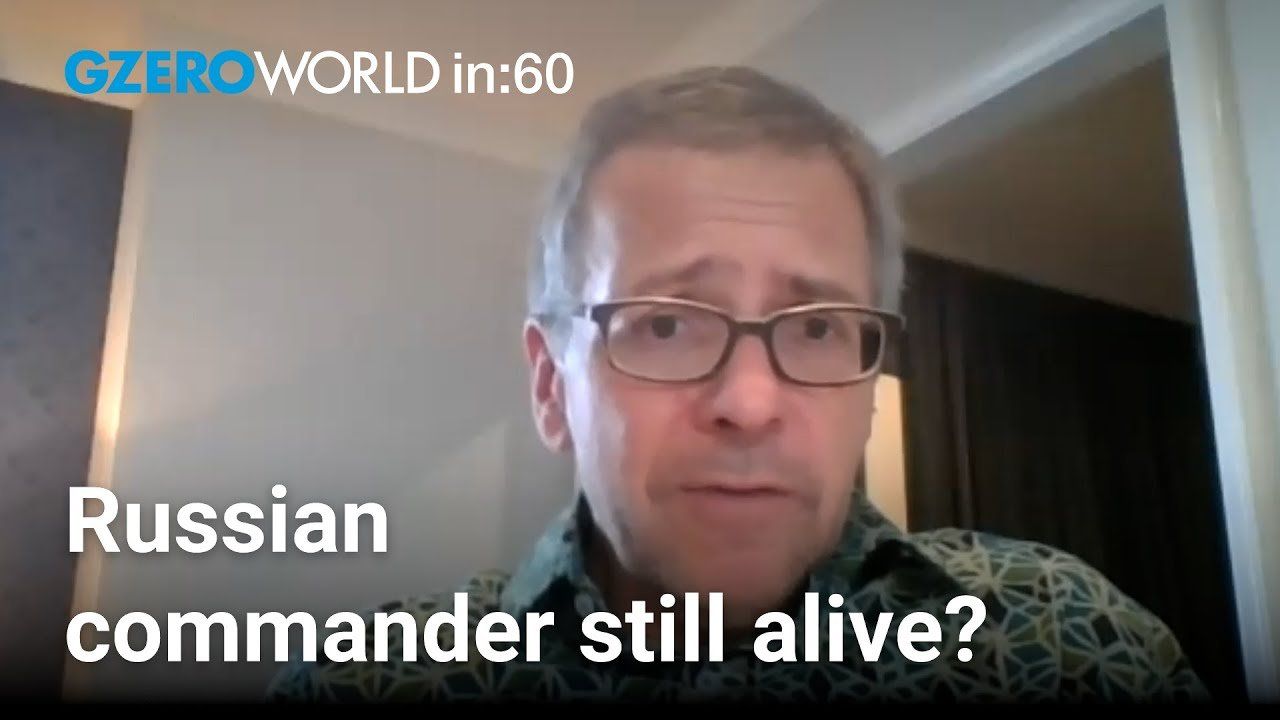Ian Bremmer shares his insights on global politics this week on World In :60.
Is Russian commander Sokolov still alive?
Black Sea fleet commander. The Ukrainians said he was killed in a missile strike, but after that missile strike, he's attending a meeting with the Kremlin and looks very much alive. Should all remember that there is a lot of disinformation and a lot of misinformation in the fog of war. You remember that Snake Island strike. And that, of course, turned out those guys didn't die. They were made prisoner and then they were released. So Russians are absolutely at fault for the invasion. Ukrainian information is meant to promote Ukrainian efforts in the war. And this is one of those instances.
Will the West intervene in Nagorno-Karabakh?
Intervene in the sense that they are trying to put pressure on the Turks and the Azeris not to engage in war crimes, not to support war crimes against the Armenians, the 120,000 Armenians living in this autonomous region that is part of Azerbaijan. Thousands and thousands are streaming out, getting out. They're not forced out, but they certainly don't feel that they're going to be safe in this region for long. The war has been lost pretty decisively by the Armenians. And the question I suspect that you are going to see a level of ethnic cleansing, ethnic migration of the Armenians from this space is going to be problematic. Armenia itself is a small country. It's going to be a serious burden for them to resettle these people. And of course, it's been their homes and their homes for generations. It's very sad to see like we've seen in the Balkans, like we've seen in Iraq after the Iraq war. But it's hard to imagine anybody intervening at this point to stop that from happening. That's where I think we are. Armenia's best friend has been Russia, and that's not very useful for them.
How is China's proactive approach to trilateral cooperation impacting its relations with South Korea and Japan?
Well, it's making them harder, especially because Japan right now is on a, their food, their seafood is being banned from China. It's a significant export because of the irradiated water from Fukushima that is being released into the Pacific. Certainly, I have a hard time seeing a friendly trilateral relationship given that and I don't think it would be fixed anytime soon. But the South Koreans and the Chinese are working hard to try to make this work, and it doesn't need to be at the head of state level. It historically hasn't been frequently. I suspect that comes off and it will be formulaic and incrementally positive, but won't lead to an immediate breakthrough in relations between those two countries.
- Disinformation the “biggest threat” from Russia – Anne-Marie Slaughter ›
- UN Security Council debates Nagorno-Karabakh ›
- Nagorno-Karabakh war flares again ›
- Armenia, Azerbaijan & the Nagorno-Karabakh crisis that needs attention ›
- Yoon leads South Korea away from China, toward the US ›
- Ian Explains: Why China’s era of high growth is over ›
- China to shake up Russia-Ukraine war ›
- Ukraine war sees escalation of weapons and words ›
- Russia-Ukraine war: How we got here ›
- “Crimea river”: Russia & Ukraine’s water conflict ›
More For You
As expected, the Supreme Court struck down the bulk of Donald Trump's sweeping “Liberation Day” tariffs as illegal … and almost nothing changed.
Most Popular
What’s Good Wednesdays™, February 25, 2026
Small businesses at a crossroads
Chris, an Army veteran, started his Walmart journey over 25 years ago as an hourly associate. Today, he manages a Distribution Center and serves as a mentor, helping others navigate their own paths to success. At Walmart, associates have the opportunity to take advantage of the pathways, perks, and pay that come with the job — with or without a college degree. In fact, more than 75% of Walmart management started as hourly associates. Learn more about how over 130,000 associates were promoted into roles of greater responsibility and higher pay in FY25.
Somewhere in the Donbas region, Ukrainian soldier Artem Bondarenko says he hasn’t slept through the night in months as he defends Eastern Ukraine.
In the latest episode of Vladimir Putin and Xi Jinping's hit wellness podcast This Authoritarian Life, we learn how positive communication patterns can break negative cycles in our relationships -- especially our relationships with Iran, Syria, Venezuela, and Cuba. #PUPPETREGIME
